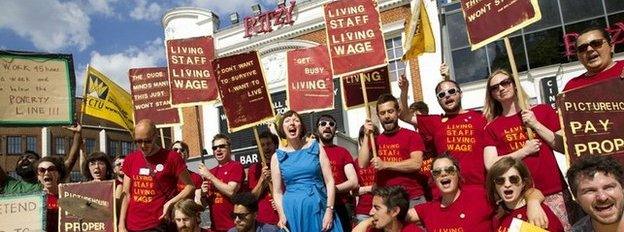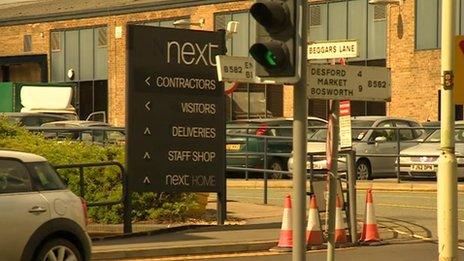What is the living wage?
- Published

The living wage is not the same as the minimum wage
The living wage is based on the amount an individual needs to earn to cover the basic costs of living.
Because living costs vary in different parts of the country, there is a different rate for London and the rest of the UK.
It is promoted by the Living Wage Foundation, external.
It has received widespread political support, but limited endorsement by employers.
Prime Minister David Cameron has said he supports the idea in principle.
The Labour leader, Ed Miliband, favours making it part of his party's manifesto for the next general election.
Both London's former and current mayor, Ken Livingstone and Boris Johnson, are supporters.
The Greater London Authority (GLA) is among the organisations that pay the living wage to their employees.

What is the difference between the living wage and the national minimum wage?
The living wage is an informal benchmark, not a legally enforceable minimum level of pay, like the national minimum wage.
The national minimum wage is set by the business secretary each year on the advice of the Low Pay Commission. It is enforced by HM Revenue and Customs (HMRC).
The living wage is currently calculated by the Centre for Research in Social Policy at Loughborough University, while the London living wage has been calculated by the GLA since 2005.
The basic idea is that these are the minimum pay rates needed to let workers lead a decent life.

How much is the living wage?
The living wage is now set at £9.15 an hour in London and £7.85 an hour in the rest of the UK.
By comparison, the national minimum wage is significantly lower. Since October 2014, the national minimum wage has been £6.50 an hour for adults aged 21 and over, and £5.13 for those aged 18 to 20.

How much do people actually earn?

Some workers have been campaigning for the living wage
The most authoritative data comes from the Annual Survey of Hours and Earnings, external compiled by the Office for National Statistics.
It shows that median weekly earnings before tax for full-time employees in April 2013 were £517, up 2.2% from £506 in 2012.
For men, full-time earnings were £556 per week, up 1.8%, compared with £459 for women, up 2.2%.
Median annual earnings were £27,000.
However, there was substantial variation across the UK. Median gross weekly earnings for full-time workers were highest in London, at £658, and lowest in Northern Ireland, at £460.
Figures for 2014 are expected later this month.

How many employers are signed up to the living wage?
At present, more than 1,000 employers are accredited by the Living Wage Foundation, committing them to pay the living wage to employed and subcontracted staff.
They include some FTSE 100 companies such as SSE, Aviva, Barclays, Pearson, and Legal & General.
However, plenty of employers pay between the minimum wage and the living wage.
Some supporters of better pay for the low-paid argue that employers who pay their staff too little are in effect benefiting from taxpayers, who subsidise the low wages of their staff by paying their employees top-up state benefits such as tax credits.
But some companies argue that paying the living wage could lead to job losses, and others say that they have been hit by the financial crisis so could not increase staff costs to this level.

Is it only seen in the private sector?
No. Some big local authorities have adopted the living wage, such as Cardiff, Birmingham and Newcastle.
Some workers have had to fight to have their employer adopt the living wage. Cleaners in the Houses of Parliament went on strike back in 2005 to demand pay rises that would bring them up to the living wage. They achieved their aim in 2006.
Some cleaners on the London Underground staged industrial action, including strikes, over two years before Transport for London (TFL) conceded a deal based on the living wage in 2010.

What is the Living Wage Commission?

The Commission is chaired by Archbishop of York Dr John Sentamu
The Living Wage Commission is an independent inquiry into the future of the living wage.
It is chaired by Archbishop of York Dr John Sentamu, and includes representatives from the TUC, the British Chambers of Commerce, and the voluntary sector.
It looked into the subject for a year, then recommended that the UK government should make it a goal to cut the number of low paid workers by one million by 2020.
It said that the government should pay its own workers the living wage, and that private sector companies that are capable should also pay.
However, it said that other firms should not be forced to do so, especially if this could put jobs at risk.
- Published16 June 2014

- Published19 May 2014

- Published15 May 2014

- Published13 May 2014
